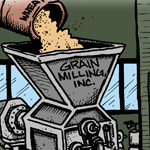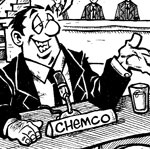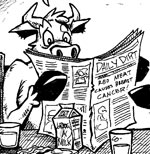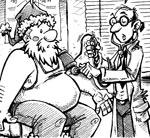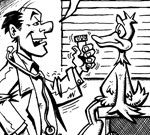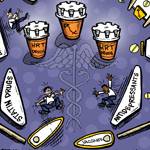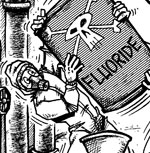Relationship Between Vitamin B6 and Depression
| Share on Facebook | Share on Twitter | Share on Google+ |
Nausea, diarrhea, loss of interest in sex in 60 per cent of women, erectile dysfunction in 90 per cent of men, memory loss, fatigue, and insomnia. It's a list long enough to make anyone depressed. And it's a list of the potential side effects of the most commonly prescribed medications for depression.
Medicine for depression is not cheap. And the side effects of medication can cause almost as much suffering as the disease itself.
Vitamin B6 is not a cure-all for depression, but with the right diet and the right supplements, it can help a great deal. The way vitamin B6 works is by helping the brain make the serotonin it needs to keep moods from turning dark.
There are three basic ways vitamin B6 helps lift depression. Vitamin B6
- Helps the brain make serotonin,
- With other B vitamins, reduces the production of brain-irritant homocysteine, and
- Helps the body make s-adenosylmethionine, also known as SAM-e.
How vitamin B6 helps the brain make serotonin. The brain takes in the amino acid tryptophan to make the mood-elevating neurotransmitter serotonin. When there is not enough vitamin B6 in circulation, the liver turns trytophan into niacin, leaving less tryptophan for the brain. And vitamin B6 keeps another chemical, kynurenine, from interfering with the brain's ability to absorb tryptophan. If you take 5-HTP for depression (a supplement that breaks down into tryptophan), then B6 is a must.
How vitamin B6 reduces production of homocysteine. People who don't eat enough fruits and vegetables tend to have higher levels of homocysteine, a form of the amino acid that can cause inflammation of blood vessels and brain tissue. Consuming choline (from meat, eggs, fish, beans, or soy) along with vitamin B12, folic acid, and vitamin B6 helps the body turn homocysteine into L-carnitine, taurine, or the antioxidant glutathione.
How vitamin B6 helps the body make SAM-e. SAM-e is widely available as a relatively expensive supplement, but the human body can make plenty of SAM-e with the help of vitamin B6, vitamin B12, and folic acid (another B vitamin). The SAM-e helps the brain return to normal day and night rhythms and adds power to prescription antidepressants, especially the older, monoamine oxidase antidepressants which are still prescribed for patients who have depression and nerve problems related to diabetes.
How much vitamin B6 is enough?
Most experts recommend complete B vitamins that include at least 1000 micrograms (mcg) vitamin B12, 250 milligrams (mg) vitamin B6, and 800 mcg of folic acid every day. Other herbs and supplements for depression, of course, may also help.
-
Skin CareMen Skin Care
-
Free ResourcesFree eBooks
-
Whatever we put our attention on will grow stronger in our life.Maharishi Mahesh Yogi
-
Featured Health SupplementTotal Balance
 provides a broad spectrum of around 80 of the nutrients that your body needs…including vitamins, minerals, trace elements, antioxidants, amino acids, neuronutrients, bioflavonoids, carotenoids, herbal extracts, enzymes and other complementary co-factor ingredients.
provides a broad spectrum of around 80 of the nutrients that your body needs…including vitamins, minerals, trace elements, antioxidants, amino acids, neuronutrients, bioflavonoids, carotenoids, herbal extracts, enzymes and other complementary co-factor ingredients.
-





